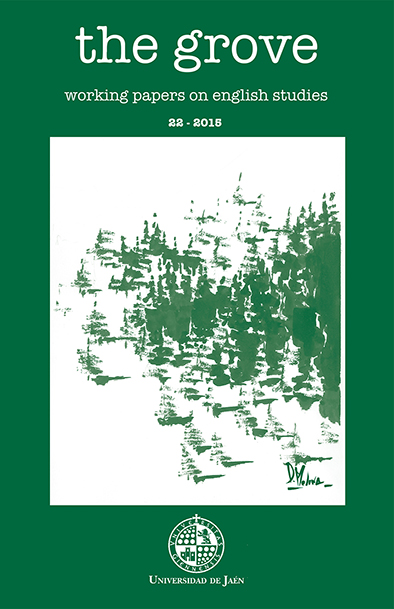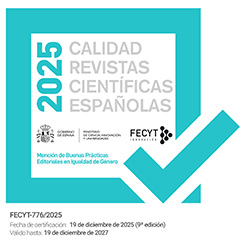"What ye divin't knaa aboot the canny lads and lasses back yem": A Study of Language and Identity in the Geordie Variety of English
Abstract
Resumen
El trabajo versa sobre la estrecha relación idioma-identidad y, más específicamente, indaga en el efecto que tiene la variedad Geordie del inglés del noreste de Inglaterra en sus hablantes, ampliando así el estudio dialectal a un ámbito social, comunitario y de identidad. Los puntos principales de esta investigación son: 1) un análisis detallado de las características lingüísticas del Geordie, tanto fonético-fonológicas como léxicas y gramaticales; 2) un estudio de la encuesta que se ha llevado a cabo sobre la identidad Geordie para el presente trabajo; y 3) la combinación de los resultados de estos tres puntos para entender el porqué de la existencia del Geordie, el porqué de su mantenimiento y el porqué de su rechazo en otras regiones del país, así como lo que supone la variedad para la comunidad.
Palabras clave: sociolingüística, fonética, fonología, Geordie, dialecto, inglés británico
Abstract
This paper concerns the close relation between language and identity and, more specifically, provides insights into the effects of the Geordie variety of the North East of England on its speakers. Dialectal studies are thus broadened to fields of society, community and identity. The pivotal points of this research are: 1) a detailed analysis of the linguistic characteristics of Geordie, not only phonetic-phonological, but also lexical and grammatical; 2) the reflection about the survey that has been conducted on Geordie identity for this paper; and 3) the combination of all these investigations in order to get a better understanding of the reasons behind the existence, maintenance and rejection of Geordie, as well as the bonds between the variety and the local community.
Keywords: sociolinguistics, phonetics, phonology, Geordie, dialect, British EnglishDownloads
References
British Library. “Geordie: a regional dialect of English”. Web. <http://www.bl.uk/learning/langlit/sounds/case-studies/geordie/> [Last accessed: 10th June 2015].
Chambers, Jack K., and Peter Trudgill. 1980. Dialectology. 2nd edition. Cambridge: Cambridge University Press, 1998.
Colley, Linda. Britons: Forging the Nation, 1707-1837. Newhaven, Connecticut: Yale University Press, 1992.
Collins, Beverley and Inger M. Mees. Practical Phonetics and Phonology: A Resource Book for Students. London: Routledge, 2003.
Corrigan, Karen P., Isabelle Buchstaller, Adam Mearns and Hermann Moisl. 2012. The Talk of the Toon. Newcastle University. Web. <http://research.ncl.ac.uk/decte/toon> [Last accessed: 11th June 2015].
Cruttenden, Alan. Gimson’s Pronunciation of English. London: Arnold, 2001.
Fairclough, Norman. Language and Power. London: Longman, 1989.
Falck, Oliver, Stephan Heblich, Alfred Lameli and Jens Südekum. “Dialects, cultural identity and economic exchange”. Institut d’Economia de Barcelona Working Papers 26 (2010). Barcelona: Universitat de Barcelona.
Green, Adrian and Anthony J. Pollard (eds.). Regional Identities in North-East England, 1300-2000. Wooldridge: Boydell, 2007.
Hetherington, Peter. “Geordies look to saint for inspiration”. The Guardian. Web. 16 June 2003. <http://www.theguardian.com/uk/2003/jun/16/society.politics> [Last accessed: 12th June 2015].
Jenkins, Jennifer. World Englishes: A Resource Book for Students. London: Routledge, 2003.
Kaye, Alan S. 2001. “Diglossia: the state of the art”. International Journal of the Sociology of Language 152: 117-129. Web. <http://www.international.ucla.edu/media/files/Kaye_diglossia.pdf> [Last accessed: 16th June 2015].
McArthur, Tom. Oxford Guide to World English. New York: Oxford University Press, 2002.
Millward, Celia M. and Mary Hayes. 1996. A Biography of the English Language. 3rd edition. Boston: Wadsworth, 2012.
Moffat, Alistair and George Rosie. Tyneside: A History of Newcastle and Gateshead from Earliest Times. Edinburgh; London: Mainstream Publishing, 2006.
Trousdale, Graeme. Introduction to English Sociolinguistics. Edinburgh: Edinburgh University Press, 2010.
Wales, Katie. Northern English, a Cultural and Social History. Cambridge: Cambridge University Press, 2006.
Watt, Dominic and William Allen. “Tyneside English”. Journal of the International Phonetic Association 33 (2003): 267-271.
Widdowson, John D.A. “Sheffield dialect on the eve of the millennium”. Transactions of the Yorkshire Dialect Society 99.19 (1999): 9-19.
Published
Issue
Section
License
Authors who publish with this journal agree to retain copyright and grant the journal right of first publication with the work simultaneously licensed under a Creative Commons Attribution License that allows others to share the work with an acknowledgement of the work's authorship and initial publication in this journal. Also, authors will retain the rights on their work, even if they will be granting The Grove. Working Papers on English Studies a non-exclusive right of use to reproduce, edit, distribute, publicly communicate and show their work. Therefore, authors are free to engage in additional, independent contracts for non-exclusive distribution of the works published in this journal (such as uploading them to an institutional repository or publishing them in a book), as long as the fact that the manuscripts were first published in this journal is acknowledged.

























